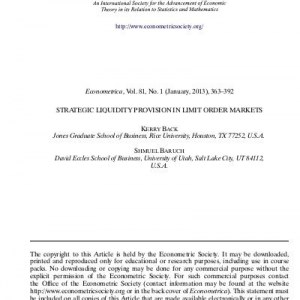
Konig, M., Zilibotti, F., Thoenig, M. and Rohner, D. (2017). Networks in Conflict: Theory and Evidence from the Great War of Africa Econometrica, 85(4):1093--1132.
-
Affiliated author
-
Publication year2017
-
JournalEconometrica
We study from both a theoretical and an empirical perspective how a network of military alliances and enmities affects the intensity of a conflict. The model combines elements from network theory and from the politico-economic theory of conflict. We obtain a closed-form characterization of the Nash equilibrium. Using the equilibrium conditions, we perform an empirical analysis using data on the Second Congo War, a conflict that involves many groups in a complex network of informal alliances and rivalries. The estimates of the fighting externalities are then used to infer the extent to which the conflict intensity can be reduced through (i) dismantling specific fighting groups involved in the conflict; (ii) weapon embargoes; (iii) interventions aimed at pacifying animosity among groups. Finally, with the aid of a random utility model, we study how policy shocks can induce a reshaping of the network structure.